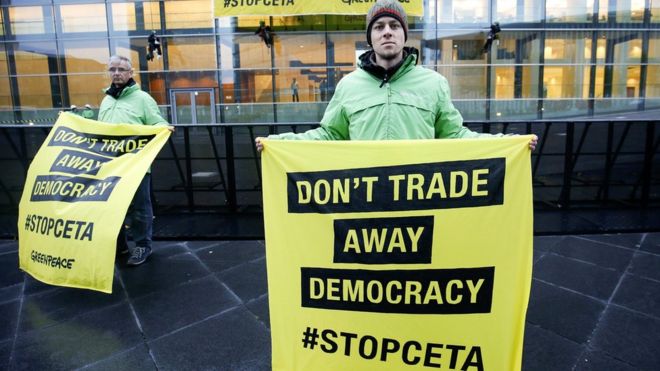
Belgium’s Trade Minister Didier Reynders says EU leaders may agree on a landmark EU-Canada trade deal this week – but only if objections from his country’s Wallonia region can be met.
EU trade ministers are discussing the Ceta deal in Luxembourg, and Wallonia’s concerns cannot be ignored. Belgium’s national government backs the deal.
Walloon MPs say Ceta favours Canadian firms and they want more safeguards for Belgian farmers.
It is the EU’s biggest trade deal yet.
Going into the Luxembourg meeting, Mr Reynders said: “The federal government is in favour [of Ceta] but we have to convince particularly Wallonia.
“I’m in permanent contact with the Walloon prime minister. I hope we’ll be able to move forward at the summit.”
Trade will be a major issue at the two-day EU summit in Brussels, which starts on Thursday.
Brexit implications
EU leaders hope to sign Ceta – the Comprehensive Economic and Trade Agreement – with Canadian Prime Minister Justin Trudeau on 27 October. The negotiations started in 2009.
Some UK politicians see Ceta as a possible model for a Brexit deal with the EU. It will not allow the degree of EU market access that UK services currently enjoy. And Ceta does not involve EU-style free movement of people.
Would Ceta be a good model for the UK?
Walloon PM Paul Magnette said he was expecting the European Commission to present an additional text addressing his region’s concerns.
On Friday the Walloon parliament, representing 3.6m people, voted against Ceta.
At a glance: Ceta
- Negotiations began in 2009 and ended in August 2014
- The deal aims to eliminate 98% of tariffs between Canada and EU
- It includes: new courts for investors; harmonised regulations; sustainable development clauses; and access to public sector tenders
- The deal is opposed by various groups, including environmental activists, trade unionists and Austrian Socialists
European Parliament briefing on Ceta
The deal requires approval by all six regional and community parliaments in Belgium, as well as the EU’s national parliaments, and the European Parliament, to take full effect.
But parts of the deal can be implemented before full ratification.
One of the most controversial areas – special investor courts to handle commercial disputes – will have to await full ratification of Ceta.
“If there are safeguard clauses for the Canadians to legitimately protect their markets against possible European exports, which might threaten them, then why not have reciprocal clauses [for Europe] too?” Mr Magnette said.
“We in Wallonia are coming under huge pressure – and sometimes we’re getting barely disguised threats,” he told Belgian RTBF news.
Wallonia wants clear safeguards on human rights and sustainable development, and protection for farmers, including maintaining the ban on hormone-treated beef, he said.
If not Canada, then who?
Slovak Economy Minister Peter Ziga, chairing the EU meeting, voiced frustration over the Belgian blockage.
He noted that Belgium was at the heart of the EU from the very start, and “it’s very near to Canada, with language connections and everything – I don’t understand the position now.
“If we don’t agree with Canada with whom will we agree?”
Opponents fear that Ceta will be used as a model to push through an even more controversial EU-US trade deal, called TTIP, much of which remains to be negotiated.
The activists argue that Ceta and similar deals put job security and social welfare at risk, in a global “race to the bottom” that serves the interests of a wealthy elite.
Greenpeace environmentalists urged EU ministers to reject Ceta. “Ceta will put the interests of multinationals above people and the planet,” the group said.
[Source:- BBC]


